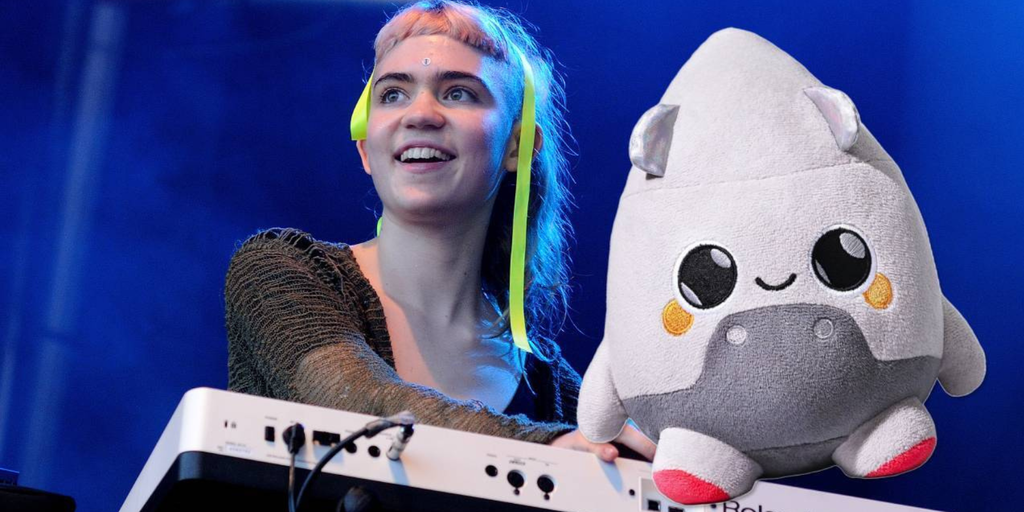A new line of children’s toys that use generative AI to interact with kids was launched on Thursday by San Francisco-based Curio, and they brought music superstar, AI enthusiast, and voice of Cyberpunk 2077’s Lizzy Wizzy, Grimes, along for the ride.
“As a parent, I obviously don't want my kids in front of screens, and I'm really busy,” Grimes said in the Curio reveal video. “So we've created some toys, Gabbo, Grok, and Grem.”
Launched in February by CEO Misha Sallee and chief toymaker Sam Eaton, Curio says its toys are designed for children aged 3 to 12 and retail for $99. An investor and advisor to Curio, Grimes also voices the Grok character. While one of the AI-powered toys shares its name with the generative AI from Elon Musk’s xAI, the two are unrelated.
Adding to the intrigue around Grimes’ involvement with the Curio launch is that she and Elon, who share three children, now individually have AI ventures named “Grok,” blurring the lines between their professional and personal relations and adding another wrinkle to their already unconventional relationship.
In fact, Curio’s Grok is powered by xAI rival and ChatGPT creator, OpenAI.
“By integrating AI into the toys, children (and adults!) can have full-on conversations with Grok, Gabbo, and Grem (yes, safety comes first, and it's secure!) to explore their imagination and practice their communication, speaking, and listening skills,” a Curio spokesperson told Decrypt in an email.
According to Curio, the collaboration with Grimes came as a response to a Twitter discussion between Grimes and tech personality Roon.
“I really feel like this is also the first step towards reducing screen time as much as humanly possible,” Grimes said. “I think when you take the screens out of it, the human mind, it just tends to work so much better, and people aren't stuck in a state of constant sort of dopamine hits that's disabled them in other aspects of their life.”
Coined by sci-fi legend Robert Heinlein in the 1961 novel “Stranger in a Strange Land,” Grok means ‘to understand,’ which may explain its popularity with chatbot developers.
In November, Musk announced the launch of Grok on Twitter. Musk’s xAI claimed Grok will have “real-time knowledge of the world” thanks to being connected to Twitter’s stream of information.
Musk and OpenAI’s CEO Sam Altman took their rivalry to the next level after Grok’s launch using the xAI chatbot to trade insults with OpenAI’s flagship AI model, ChatGPT.
A Tale of two trademarks
Even though Musk’s Grok was released earlier than Curio’s toy, a search of the U.S. Patent and Trademark Office database of trademark filings reveals that both xAI and Curio hold active trademarks for “Grok.”
According to the USPTO, Curio filed its trademark application for Grok on September 12, 2023, which was updated to “live” on October 2. Musk’s xAI later filed two applications for Grok, one on October 23 and another on November 7, 2023, with statuses updated to “live” on October 27 and November 10, respectively.
Notably, Musk announced the name of xAI’s chatbot on November 3, and the first users were given access to Grok on November 5. Grimes’ Grok was announced yesterday. In a trademark dispute, public use of a trade name is one of the key criteria for establishing (or disputing) validity.
The two companies’ trademarks may not collide directly, however.
In its filing, Curio’s Grok is listed as an electronic learning toy, including plush, talking dolls, and novelty items “in the nature of artificial intelligence” conversational stuffed dolls. On the other hand, Musk's Grok is listed as a downloadable computer and software for the artificial production of human speech and text.
AI and kids
Curio is not the first company to connect kids with generative AI. In October, Amazon announced a new Explore with Alexa feature that gives children personalized and educational responses to prompts.
While AI toys are sure to make their way into homes for the holidays, experts and policymakers warn that AI can be a source of harm and manipulation. In August, a report by the Center for Countering Digital Hate said that generative AI tools created “harmful content,” including text and images related to eating disorders, 41% of the time.
Facebook's parent company, Meta, has gone heavily into artificial intelligence and was the focus of a 34-state lawsuit in October that claimed the company manipulated children through its Facebook and Instagram, adding that the social media sites posed a risk to children’s mental health.
As AI chatbots become more commonplace, psychologists also warn about the potential of children becoming too attached to the technology.
“Children can form deep relationships with inanimate objects, like a teddy bear—now you have this tool that gives you exactly what you need—because AI is going to be amazing at figuring out what you want to hear and giving that to you,” psychologist and executive coach Banu Kellner previously told Decrypt.
Edited by Ryan Ozawa.




